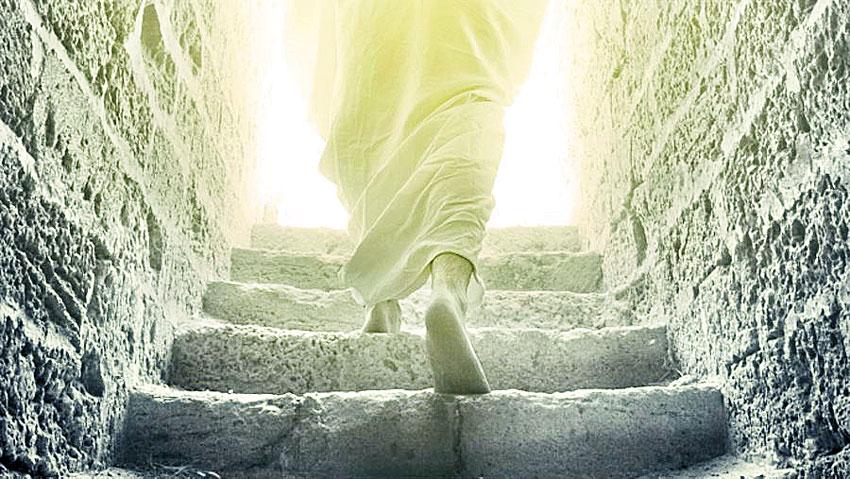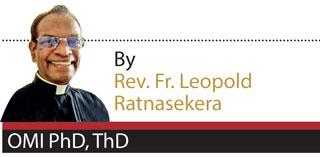08 Apr 2023 - {{hitsCtrl.values.hits}}

 Easter, the greatest Christian religious festival is about the good news that Jesus of Nazareth, the guru and the prophet who through an unjust trial was condemned to death, crucified and buried, yet rising again to life after three days of lying in the tomb.
Easter, the greatest Christian religious festival is about the good news that Jesus of Nazareth, the guru and the prophet who through an unjust trial was condemned to death, crucified and buried, yet rising again to life after three days of lying in the tomb.
The tomb was empty and the Risen Lord was at first difficult to recognize and identify, sometimes looking as the gardener who watched over the tombs or a travelling companion on the road to some of his disciples distraught and weighed down with despair.
Another time he was walking on the beach and preparing breakfast for the disciples returning from a night’s fishing round. Yet there were particular manifestations whereby he was easily recognized such as calling his disciples by their names, the sound of his voice revealing the Nazarene or sitting down in the inn near the village of Emmaus to break bread with two of his disciples. Often it was an appearance with the greeting: “It is I, do not be afraid, Peace be with you”.
The Resurrection of Jesus validated all that was seen and heard of him during three years of public ministry and travels covering the city of Jerusalem, other cities and villages along beaches and on land.
We are told that many crowds used to gather in the hills, beaches and in the privacy of homes and synagogues to hear him and many sick were brought to him for healing and the possessed freed for demonic power.
To make the situation more incredible he used miracles to prove that he had the power to forgive sins and that wherever faith in him was present, even among gentile pagans, miracles were possible as in the case of the servant of the Roman centurion and the Canaanite woman who had an issue of blood from which she was cleansed through the sheer touching of his garment.
He welcomed children making them symbols and signs of his kingdom thus challenging the adult world to child-like attitudes. Many women followed him in his company with his disciples who assisted him with his material needs.
He touched lepers in healing and exorcised the dumb, the blind and the deaf and made the lame walk again. He claimed to exercise and fulfil the task of a messiah of a kind other than a merely political one that many religious leaders and popular national belief expected would free the land from the colonial yoke of Roman rule. Jesus taught us a new way of universal love that demands us to love even our enemies and do good to those who hate us. That teaching on neighbourly love was revolutionary. He manifest a new way of exercising authority as a humble service by washing the feet of his disciples, which usually was a task allotted to the slaves when the master of the house would host any guests.
Many great Pharaohs and Caesars have come and gone in the history of ancient kingdoms and epochs, but only the story of the humble son of a Galilean carpenter, Jesus of the village of Nazareth has stood the test of centuries.
Those who believe him to be the saviour of mankind and the Son of God are more than a third of the world’s nearly seven billion of humanity. The itinerant preacher of Palestine has touched to this day millions of believers worldwide and his Sermon on the Mount about beatitudes has become in the literature of religions, a spiritual classic that has touched many a spiritually minded person and mystics including the great Mahatma Gandhi, the founding father of modern India.
Jesus Christ, his life, death and Resurrection are at the heart of the message of all Christian churches as they strive to make him known and loved by the modern world.
His teachings have even inspired further applications in the area of socio-political and international issues that deeply touch the hum-drum life of modern man, wherever they live. Being prophetical teaching, at times the Christian value system comes into stark conflict with what the technocratic and secular world believes and acts upon.
This struggle is seen in the field of scientific research, ethical and moral issues and those pertaining to life and health. The authentic view of the Christian churches on issues such as abortion, assisted suicide called euthanasia, artificial birth control, same-sex marriage and other issues bordering on sexual morality including homosexuality and gender change are well known for their stubborn defence and at times aggressive criticism.
The standard of Christianity is always rooted in the nobility and inviolability of life and the dignity of love inspired by the vision of the God of life and love. Hence, the work of the Churches is to establish a culture of life against all lethal forms of death and assist in building a modern civilization of love, mutual respect and dialogue among the people. In a poly-centric world with cultural, religious and political diversity, the only possible path to peace and collaboration is that of dialogue which helps in accepting differences realistically and pursuing areas of convergence and communion.
The religion instituted by Jesus of Nazareth is one of universal brotherhood. Even in his day, he treated the people of his race, which was Jewish and those non-Jews like those of Samaria and the Pagans of the Roman Empire equally. He was open to all including women and children who were marginalized in his own society. The plague that was nailed to the top of the cross where he was crucified read: Jesus of Nazareth, King of the Jews.
Pilate the Roman Governor of his region had it written in Greek, Latin and Hebrew which incidentally was a literal combination of Greek culture known for the earliest philosophies coming from Athens in Greece, the cultural center of that time; Latin, the official language of the Roman Empire and Hebrew: the language of the Sacred Jewish Scriptures.
What a significant and imposing one indeed at that! Thus the cross of Christ is not only a sign of contradiction but also, by contrast, a symbol of incredible reconciliation, harmony and unity.
Jesus of Nazareth who appeared in the occupied land of Palestine, was no mere historical individual. He has universal significance. Indeed all religious founders belong to the entire humanity. The dignity of man, the solidarity of peoples, the nobility of human work, the care for the earth, the mending of differences among peoples and nations, peace among nations and the building up of goodwill are some of the corollaries that seep down from the Christian teaching about the love of God and love of neighbour.
Jesus marvelled at the mysteries of nature as he contemplated the lilies of the fields and the birds. He loved the hills, the mountain ranges and the beaches from where he taught large crowds and even fed them. Yet, he taught that we humans are more worth than any of these about which God cares, feeding the birds who do not spin and gather into barns and the lilies who are so elegantly beautiful. It was a virtue to break even the law of the Sabbath to go out in succour to someone in need. Religion is interior and that of the heart and not mere observance of external laws and prescriptions which at times may be needed.
But one should not be a whitened sepulchre: elegant from the outside and all rotten inside. Hence we are invited to judge the power of religions more from the inner spiritual experience that cleans the mind and disciplines the heart than merely by external rituals, rites and celebrations however exotic and popular they may be. The power of religions lies in their liberating potential to change and transform the adepts in their lives. Very often this inner reality does not happen though religious doctrines and codes of ethics are acclaimed from the roof-tops of temples, churches and shrines in question.
Given the rather distressful state of the world, a rebirth of humanity across religions, cultures and civilizations appears to be a dire need of the hour. The moment being decisive, projects for renewal and reform have to be initiated effectively.
The content of the Easter message is a halt to the sense of fear and insecurity to be accompanied by peace within and without. It is also the Risen Lord Jesus who commissions his chosen disciples to venture into the whole world and proclaim the good news about the Kingdom of God which is nothing by a world society animated, inspired, motivated and filled with the love of neighbour. It must help emerge a humanity which will make this earthly home a habitable one where all resources are shared equally without any country usurping what others have a right to have.
It has to be a world order where cultures, economies and political systems contribute towards achieving the common good. In light of the above considerations, Sri Lanka needs to achieve freedom from the oppressive cycles of karma that have precipitated us into the depths of tragedy and catastrophe. The country urgently needs to undertake the imminent task of a rebirth: one that rediscovers the spiritual core of her religions in the kind of multi-religious society we have, coupled with the preservation of the perennial cultural values we have long held as noble and reconciliation in the field of politics that has caused many a disaster in the country for the last seven decades.
We need people to elect wisely only future leaders who are truly patriotic and Statesmen of the calibre of our founding fathers. We need a citizenry which is truly introspective, exercising its franchise and democratic rights intelligently, entrusting to the seats of governance only those who would be true leaders spearheading a re-born Sri Lanka, harbingers of a new nation.
10 Jan 2025 39 minute ago
10 Jan 2025 2 hours ago
10 Jan 2025 3 hours ago
10 Jan 2025 4 hours ago
10 Jan 2025 5 hours ago